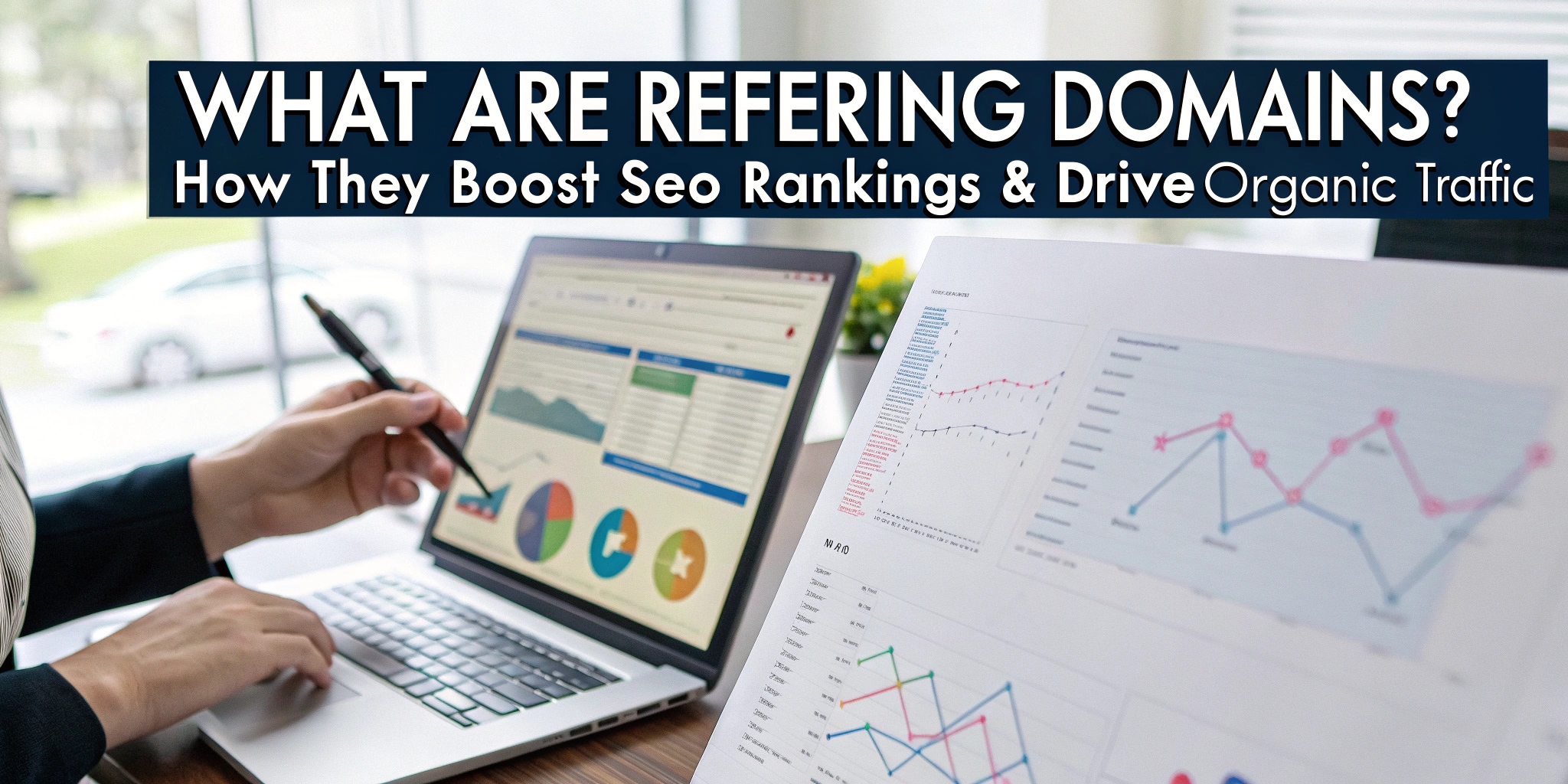In the world of search engine optimization (SEO), one term that often pops up is "referring domains." Whether you're a website owner, blogger, or digital marketer, understanding what referring domains are can help you improve your search engine rankings, drive organic traffic, and grow your online presence.
This blog will help you understand what referring domains mean, how they work, and why they are essential for your website's SEO. We'll also explore how you can get more referring domains, how to track them, and the common mistakes you should avoid. All of this is explained in simple language for easy understanding.
Let's dive into the basics of referring domains and their role in SEO.
What Are Referring Domains?
A referring domain is any external website that links to your website. In simple terms, if another site mentions your website and includes a clickable link to it, that site is considered a referring domain for you. These links are essential because they show that your content is being noticed and trusted by other websites.
Example:
Imagine a travel blog writes an article about the best hotels in your city and includes a link to your hotel's booking page. That travel blog becomes a referring domain for your website because it is sending traffic and link signals to you.
Referring Domains vs. Backlinks: What's the Difference?
A backlink is a single link from one web page to another. A referring domain, on the other hand, is the overall website that gives one or more backlinks. So, if one website links to your site five times from different articles, you have five backlinks but only one referring domain.
Key Differences Between Backlinks and Referring Domains:
- Backlinks refer to individual links from a website to your site.
- Referring domains refer to the unique websites providing those backlinks. One referring domain can provide multiple backlinks.
Types of Referring Domains
There are two key types of referring domains to consider in SEO:
- Unique Referring Domains: These are websites linking to you for the very first time. They are valuable because they add new signals of trust and authority to your site. Gaining unique referring domains is essential for SEO growth.
- Repeated Referring Domains: These are websites that have linked to you before and are linking again. While these still help your SEO efforts, they carry less impact compared to new, unique domains.
Having a mix of both types is healthy, but growing the number of unique referring domains is especially important for improving your website's SEO.
How Referring Domains Work for SEO
<!-- wp:paragraph -->When a website links to your content, search engines like Google see it as a positive signal. These links are known as inbound links or external links, and they help increase your website's authority and trustworthiness. The website that provides the link is called the referring domain.
How a Website Earns Referring Domains:
You earn a referring domain when someone visits your content and finds it helpful, informative, or interesting enough to share. If they include a link to your page in their blog, article, or web content, your site gains a new referring domain. The better your content, the more likely other websites are to link to it.
The Role of External Websites in SEO
External websites act as promoters when they link to your content. They not only drive new visitors to your website but also help boost your credibility in the eyes of search engines. The more reliable and relevant the linking website is, the more SEO value the link carries.
Examples of Referring Domains:
- A blog reviewing digital tools includes a link to your product page.
- A news article quotes your statistics and links to your research blog.
- A popular industry directory lists your business and links to your website.
Having several referring domains from different quality sources helps improve your site's visibility on search engines, brings more traffic, and builds online trust. That's why link-building strategies often focus on earning new referring domains regularly.
Why
🚀 New Batch Starting Soon!
Don't miss your chance to enroll now.
00
Days
00
Hours
00
Minutes
00
Seconds
Referring Domains Matter for SEO
🚀 New Batch Starting Soon!
Don't miss your chance to enroll now.
Referring domains are essential for SEO because they show search engines that others trust your website. When several other websites link to your content, it tells search engines like Google that your site has helpful and reliable information, which can help your website appear higher in search results.
Backlinks Are Votes of Trust:
Every time a website links to yours, it's like casting a vote in your favor. The more unique websites that link to you, the more trust you build. These links show that your website has authority and valuable content.
Improve Website Authority:
Your website's authority grows when it is mentioned and linked by multiple high-quality websites. This authority is one of the key factors search engines use to decide where to rank your site. The higher your authority, the better your chances of ranking on the first page of search results.
Quality Over Quantity:
One link from a high-authority, trusted website can be more potent than many links from low-quality or irrelevant sites. For example, 10 links from 10 respected websites are far better than 100 links from one spammy website. Search engines prefer links from websites that are related to your topic or industry.
In short, building a wide range of good referring domains helps improve your search engine rankings, increases website traffic, and grows your online reputation safely and effectively.
How to Check Your Referring Domains
Keeping track of your referring domains is a smart step in managing your website's SEO. Luckily, there are many easy-to-use SEO tools available that can help you monitor which websites are linking to your site.
Tools to Use:
- Google Search Console: This free tool from Google helps you see who is linking to your site, what pages are getting links, and how many referring domains you have.
- Ahrefs: A powerful SEO tool that shows a detailed list of referring domains, the number of backlinks, and the strength of each link.
- SEMrush: Excellent for tracking link-building efforts and analyzing the authority of referring domains.
- Moz Link Explorer: Helps you find new and lost referring domains, providing metrics like domain authority and spam score.
Metrics to Look At:
When checking your referring domains, pay attention to the following:
- Total number of referring domains
- Quality and authority score of each referring site
- How many backlinks you're getting from each domain
- Anchor text used in the links (the clickable words that point to your website)
How to Get More Referring Domains
Getting more referring domains is essential for growing your website's SEO strength. The more high-quality websites that link to your content, the more trust and authority your site builds in the eyes of search engines. Here are simple and effective ways to increase your referring domains:
- Guest Posting and Outreach:
Guest posting involves writing content for other websites in your niche. When you contribute valuable articles, you can include a link back to your website. It not only provides a backlink but also adds a new referring domain. Reach out to blogs, forums, or businesses in your industry and offer valuable content in exchange for a link.
- Create Shareable Content:
Focus on creating content that people naturally want to link to. It includes detailed how-to guides, original research, industry statistics, infographics, or helpful tools. If your content is valuable, it's more likely to be picked up and shared by other websites.
- Submit to Online Directories:
List your website on relevant and trusted directories such as Clutch, JustDial, Yelp, or local business directories. These platforms often include a backlink to your site, adding a new referring domain.
- Build Real Relationships:
Networking is key. Connect with bloggers, influencers, journalists, and web admins in your field. When they know and trust your brand, they are more likely to mention and link to your content in their posts.
By using these methods consistently, you can build a strong and diverse set of referring domains that will help your website rank better and reach more people online.
Common Mistakes to Avoid
While building referring domains is excellent for SEO, making mistakes can hurt your rankings instead of helping them. Here are some common link-building mistakes you should stay away from:
- Buying Backlinks: Buying backlinks is against Google's rules. If you're caught, your website could be penalized or even removed from search results.
- Getting Links from Low-Quality or Spammy Sites: Backlinks from irrelevant, low-quality websites can hurt your SEO efforts.
- Ignoring Relevance: Ensure the websites linking to you are related to your niche or industry.
- Over-Optimized Anchor Text: Use a mix of anchor texts—branded, generic, and keyword-based—for a more natural link profile.
- Ignoring Link Diversity: Relying too much on one type of backlink can limit your SEO growth.
Real-Life Example: The Power of Referring Domains
A digital marketing blog created a free downloadable SEO checklist and shared it through their website and social media. The checklist was clear, helpful, and easy to follow. Soon, other bloggers, content creators, and digital marketers discovered it and started linking to the checklist from their own websites and blog posts.
Results:
- The creceived over 80 new referring domains in just three months.
- Organic traffic increased by about 40%, bringing in more readers and potential customers.
- Several blog articles started ranking on the first page of Google.
This example clearly shows that when you publish helpful, original, and shareable content, it naturally attracts attention from other websites. As more people link to your content, you earn new referring domains, which boosts your SEO.
Conclusion
To sum it up, referring domains are websites that link to your website. These links are essential because they help search engines like Google understand that your site is valuable and trustworthy. The more unique and high-quality referring domains you have, the better your chances of ranking higher in search results.
Getting good referring domains takes time, but it's worth the effort. Focus on creating helpful content, building relationships with other websites, and sharing your content in the right places. Avoid bad practices like buying backlinks or getting links from spammy sites, as these can harm your website instead of helping it.
Make use of SEO tools like Google Search Console, Ahrefs, and SEMrush to track your referring domains regularly. These tools help you see which websites are linking to you and how strong those links are. Keeping an eye on your progress can help you improve your link-building strategy.
In the long run, a strong list of referring domains will help your website grow in authority, bring in more organic traffic, and build a better online presence.



